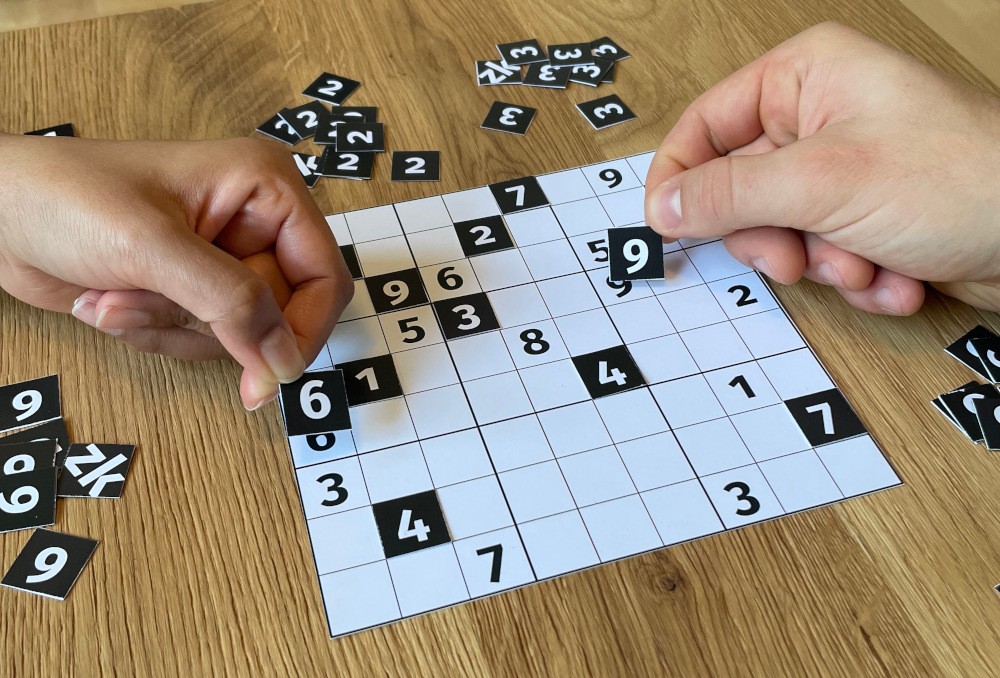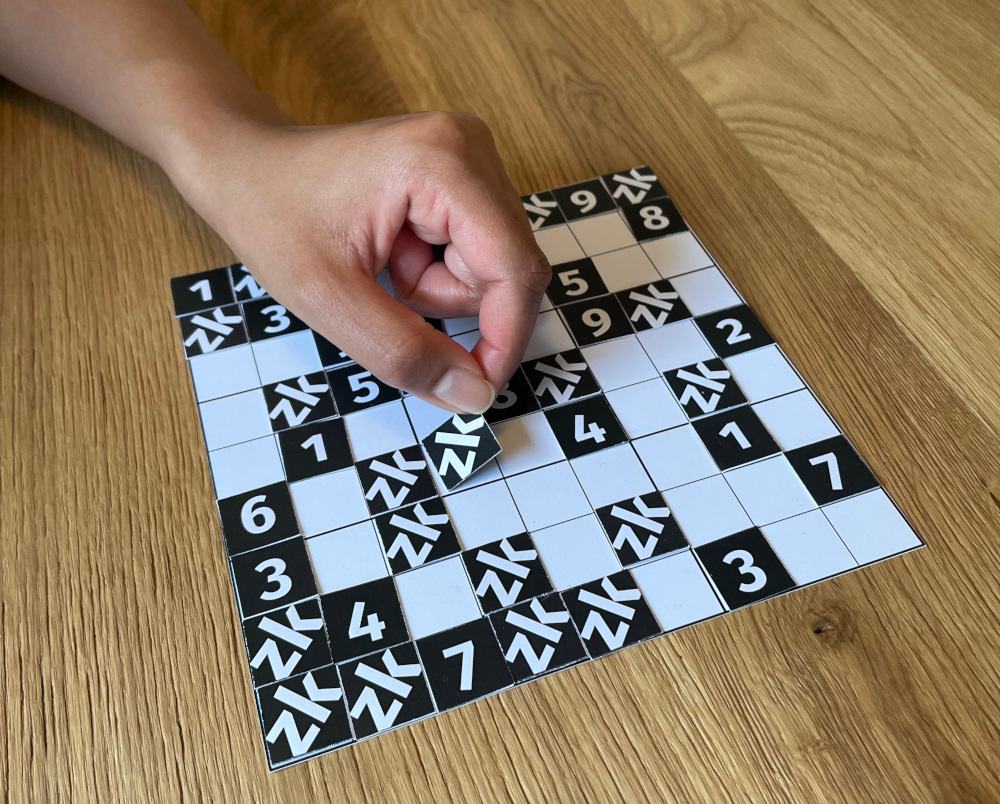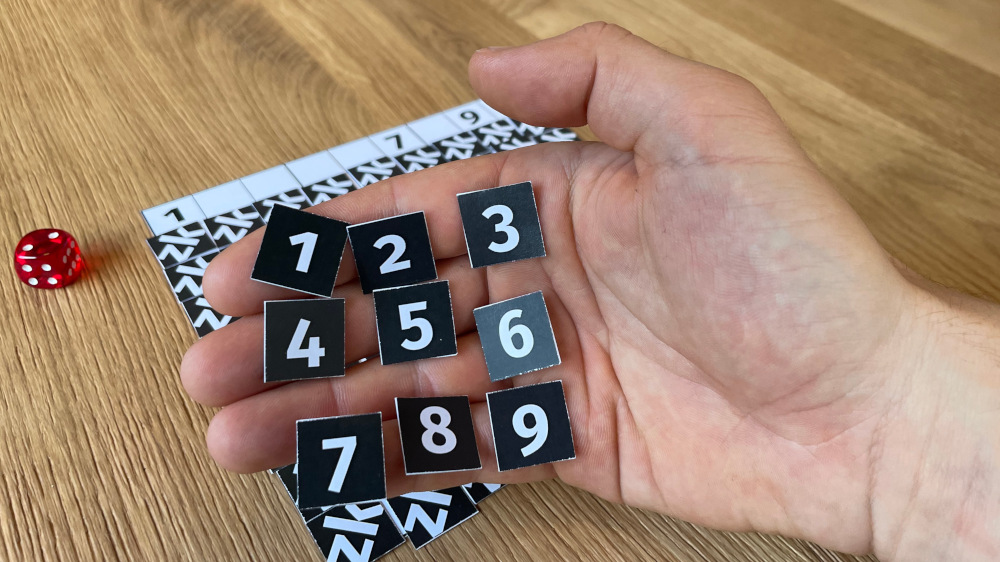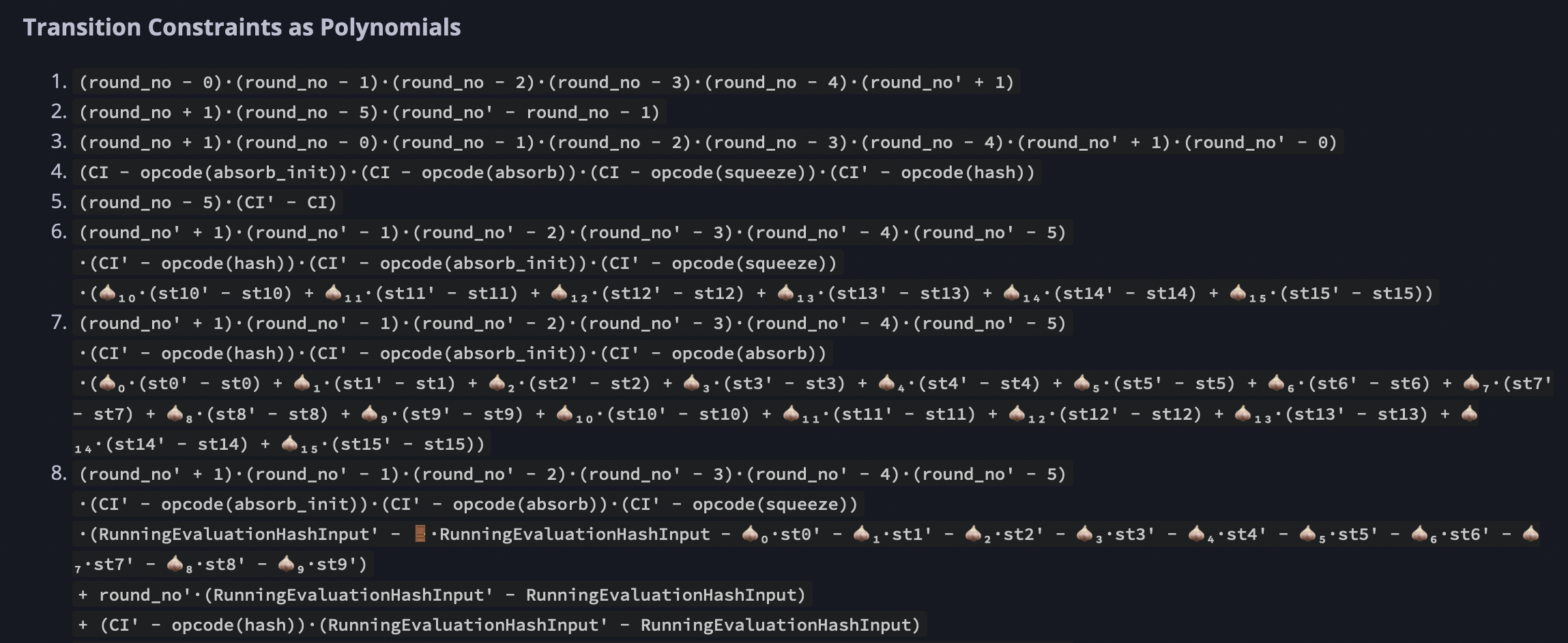Practical zk
applications of
Triton VM
Simon Shine March 30, 2023
Slides available on: https://github.com/sshine/triton-vm-slides
Feel free to interrupt with questions.
About me
- 2021: Penneo
- 2022: neptune.cash: zk-STARKs
- 2023: nerve smart systems.com: High-power battery EV chargers
I've been 🦀'ing out for 16 months now
Summary of talk
- Zero-knowledge protocols (examples, uses)
- Turning problems into polynomials (briefly)
- Turning a set of VM instructions into equations
- Zero-knowledge protocols (assembly edition)
- Abusing the
synpackage: "Rust" on Triton VM
Part 1:
Zero-knowledge protocols
zudoku.xyz by Ferdinand Sauer (CC-BY 4.0)

zudoku.xyz by Ferdinand Sauer (CC-BY 4.0)

zudoku.xyz by Ferdinand Sauer (CC-BY 4.0)

Questions so far?
When are zk protocols valuable for society?
They let us prove quantified risk with privacy enabled.
Loan / insurance scoring without leaking...
- how much you earn
- when and what you buy
- when, where and how fast you go
- your heart rate, cholesterol, blood sugar
How do you translate this into computer problems?
Using polynomials.
Part 2:
Turning problems into polynomials
Prove you know the millionth Fibonacci number (without revealing the calculation or the number)
Prove you know a polynomial
...in fewer than 1 million steps!
A constraint checking polynomial
Prove you know a polynomial
How to express the constraint for
Let's invent some more polynomials:
Clearly,
Prove you know polynomials
(dividing a polynomial can happen with long polynomial division, or FFTs)
Status
$C(P(x)) = Z(x)·D(x)$ - Alice claims to have
$C(P(1\text{ million}))$ - Bob knows
$Z(x)$ , their conviction needs$D(x)$ . - Bob gives Alice sample
$x$ 'es. - Alice gives Bob
$D(x)$ 'es. - Bob believes Alice with some probability.
- Repeat this process until the probability is astronomically likely.
...since we're 10% into the math behind zk-STARKs.
Part 3:
Turning a set of VM instructions into equations
-
nop$ci_t = opcodes[nop]$ $clk_t + 1 = clk_{t+1}$ $pc_t + 1 = pc_{t+1}$
-
add$stack[0]_{t+1} = stack[0]_t + stack[1]_t$ - "is a binary operation"
- "does not modify memory"
-
push$n$ $stack[0]_{t+1} = n$ $stack[1]_{t+1} = stack[0]_t$
https://triton-vm.org/spec/arithmetization.html
Part 4:
zk protocols (assembly edition)
Prove $Fib(i)$
// Initialize stack: _ 0 1 i
main:
push 0
push 1
divine
call fib-loop
write_io // After loop, this is 0
write_io // After loop, this is Fib(i)
halt
fib-loop:
dup0 skiz call fib-step
dup0 skiz recurse
return
// Before: _ a b i
// After: _ b (a+b) (i-1)
fib-step:
push -1
add
swap2
dup1
add
swap1
swap2
return
Prove valid sudoku
Made by Alexander Lemmens, Simon Shine
main:
call initialize_primes
call read_sudoku
call initialize_flag
call write_sudoku_and_check_rows
call check_columns
call check_squares
push 0
read_mem
assert
halt
// For mapping legal Sudoku digits to distinct primes.
// Helps with checking consistency of rows, columns, and boxes.
initialize_primes:
push 1 push 2 write_mem pop
push 2 push 3 write_mem pop
push 3 push 5 write_mem pop
push 4 push 7 write_mem pop
push 5 push 11 write_mem pop
push 6 push 13 write_mem pop
push 7 push 17 write_mem pop
push 8 push 19 write_mem pop
push 9 push 23 write_mem pop
return
read_sudoku:
call read9
call read9
call read9
call read9
call read9
call read9
call read9
call read9
call read9
return
read9:
call read1
call read1
call read1
call read1
call read1
call read1
call read1
call read1
call read1
return
// Applies the mapping from legal Sudoku digits to distinct primes.
read1: // _
read_io // _ d
read_mem // _ d p
swap 1 // _ p d
pop // _ p
return
initialize_flag:
push 0
push 1
write_mem
pop
return
// row0 row1 row2 row3 row4 row5 row6 row7 row8
write_sudoku_and_check_rows:
push 9 // row0 row1 row2 row3 row4 row5 row6 row7 row8 9
call write_and_check_one_row // row0 row1 row2 row3 row4 row5 row6 row7
// 18
call write_and_check_one_row // row0 row1 row2 row3 row4 row5 row6 27
call write_and_check_one_row // row0 row1 row2 row3 row4 row5 36
call write_and_check_one_row // row0 row1 row2 row3 row4 45
call write_and_check_one_row // row0 row1 row2 row3 54
call write_and_check_one_row // row0 row1 row2 63
call write_and_check_one_row // row0 row1 72
call write_and_check_one_row // row0 81
call write_and_check_one_row // 90
pop // ⊥
return
write_and_check_one_row: // s0 s1 s2 s3 s4 s5 s6 s7 s8 mem_addr
push 1 // s0 s1 s2 s3 s4 s5 s6 s7 s8 mem_addr 1
call multiply_and_write // s0 s1 s2 s3 s4 s5 s6 s7 (mem_addr+1) s8
call multiply_and_write // s0 s1 s2 s3 s4 s5 s6 (mem_addr+2) (s8·s7)
call multiply_and_write // s0 s1 s2 s3 s4 s5 (mem_addr+3) (s8·s7·s6)
call multiply_and_write // s0 s1 s2 s3 s4 (mem_addr+4) (s8·s7·s6·s5)
call multiply_and_write // s0 s1 s2 s3 (mem_addr+5) (s8·s7·s6·s5·s4)
call multiply_and_write // s0 s1 s2 (mem_addr+6) (s8·s7·s6·s5·s4·s3)
call multiply_and_write // s0 s1 (mem_addr+7) (s8·s7·s6·s5·s4·s3·s2)
call multiply_and_write // s0 (mem_addr+8) (s8·s7·s6·s5·s4·s3·s2·s1)
call multiply_and_write // (mem_addr+9) (s8·s7·s6·s5·s4·s3·s2·s1·s0)
push 223092870 // (mem_addr+9) (s8·s7·s6·s5·s4·s3·s2·s1·s0) 223092870
eq // (mem_addr+9) (s8·s7·s6·s5·s4·s3·s2·s1·s0==223092870)
skiz // (mem_addr+9)
return
push 0 // (mem_addr+9) 0
push 0 // (mem_addr+9) 0 0
write_mem // (mem_addr+9) 0
pop // (mem_addr+9)
return
multiply_and_write: // s mem_addr acc
dup 2 // s mem_addr acc s
mul // s mem_addr (acc·s)
swap 1 // s (acc·s) mem_addr
push 1 // s (acc·s) mem_addr 1
add // s (acc·s) (mem_addr+1)
swap 1 // s (mem_addr+1) (acc·s)
swap 2 // (acc·s) (mem_addr+1) s
write_mem // (acc·s) (mem_addr+1)
swap 1 // (mem_addr+1) (acc·s)
return
check_columns:
push 1
call check_one_column
push 2
call check_one_column
push 3
call check_one_column
push 4
call check_one_column
push 5
call check_one_column
push 6
call check_one_column
push 7
call check_one_column
push 8
call check_one_column
push 9
call check_one_column
return
check_one_column:
call get_column_element
call get_column_element
call get_column_element
call get_column_element
call get_column_element
call get_column_element
call get_column_element
call get_column_element
call get_column_element
pop
call check_9_numbers
return
get_column_element:
push 9
add
read_mem
swap 1
return
check_squares:
push 10
call check_one_square
push 13
call check_one_square
push 16
call check_one_square
push 37
call check_one_square
push 40
call check_one_square
push 43
call check_one_square
push 64
call check_one_square
push 67
call check_one_square
push 70
call check_one_square
return
check_one_square:
read_mem
swap 1
push 1
add
read_mem
swap 1
push 1
add
read_mem
swap 1
push 7
add
read_mem
swap 1
push 1
add
read_mem
swap 1
push 1
add
read_mem
swap 1
push 7
add
read_mem
swap 1
push 1
add
read_mem
swap 1
push 1
add
read_mem
swap 1
pop
call check_9_numbers
return
check_9_numbers:
mul
mul
mul
mul
mul
mul
mul
mul // 223092870 = 2·3·5·7·11·13·17·19·23
push 223092870
eq
skiz
return
push 0
push 0
write_mem
pop
return
Learn more
Vitalik Buterin's tutorial part 1:
Alan Szepieniec's tutorials:
Ferdinand Sauer's talk: How to build a zk-VM
Andrew Milson's miniSTARK:





